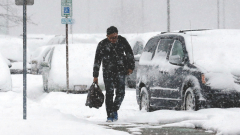 Important ways to help you protect your family members in difficult situations
Important ways to help you protect your family members in difficult situations
ATLANTA, Ga. – Enviro-Log®, Inc., a leader in eco-friendly products for home heating and outdoor activities, urges households to prepare for extreme winter weather by following important safety tips that can help protect family members.
“Every family should be prepared for extreme winter weather which could result in loss of power and utilities at home for an extended period of time or becoming stranded in your vehicle along the roadside,” said Ross McRoy, president of Enviro-Log, Inc. “It is important to make sure all family members know what to do in these situations and have access to emergency kits stored in homes and vehicles in times of need. Too often people don’t think about preparing until after the situation has occurred and they underestimate how long it will take for help to arrive.”
McRoy stresses some key essentials to make difficult situations more manageable.
Have an emergency kit in your house.
• At least one gallon of water per person per day for at least 10 days, for drinking and sanitation
• 10 day supply minimum of non-perishable food and a manual can opener
• A battery-powered or hand-crank NOAA Weather Radio with tone alert, and extra batteries
• A flashlight and extra batteries
• A lighter, flint or waterproof matches for starting fires
• Candles
• Manufactured firelogs* or firewood to be used for home heating and cooking (*only brands approved for cooking)
• A first-aid kit
• Moist towelettes, garbage bags and plastic ties for personal sanitation
• A laminated area map and compass
• A cell phone with an extra battery
• A hand-crank light with solar charger and cell phone charger adapter
• A land-line phone that operates without electrical power
• Any special-needs items for children, seniors or people with disabilities
• Water, food and supplies for your pets
• Supply of critical medicines and prescriptions
Carry a survival kit in your vehicle.
• A first-aid kit
• Thermal blankets or sleeping bags
• A cell phone with an extra battery
• A hand-crank light with solar charger and cell phone charger adapter
• A windshield scraper with snow brush
• Flashlight with batteries
• Extra winter clothes including shoes, hats, gloves and hand warmers
• Survival knife
• Compact shovel
• Traction aids (bag of sand or cat litter) and tow chain
• Emergency flares
• Jumper cables
• Non-perishable food and bottled water
• A laminated road map
• A transportable non-restrictive heat source such as manufactured firelogs (firewood cannot be transported by law in some locations)
• A non-liquid firestarter and waterproof matches
• Any special-needs items for children, seniors or people with disabilities, who might be travelling with you
• Water and supplies for any pets travelling with you
McRoy also encourages families to use extra caution and follow proper safety guidelines when operating portable generators. McRoy recommends Occupational Safety and Health Administration (OSHA) guidelines on proper generator use, which can be found at: http://www.osha.gov/OshDoc/data_Hurricane_Facts/portable_generator_safety.pdf
For additional information on preparing for extreme winter weather, please visit:
· Centers for Disease Control and Prevention (CDC) – www.bt.cdc.gov/disasters/winter/guide.asp
· Federal Emergency Management Association (FEMA) — www.ready.gov/winter-weather
· Red Cross – www.redcross.org/



